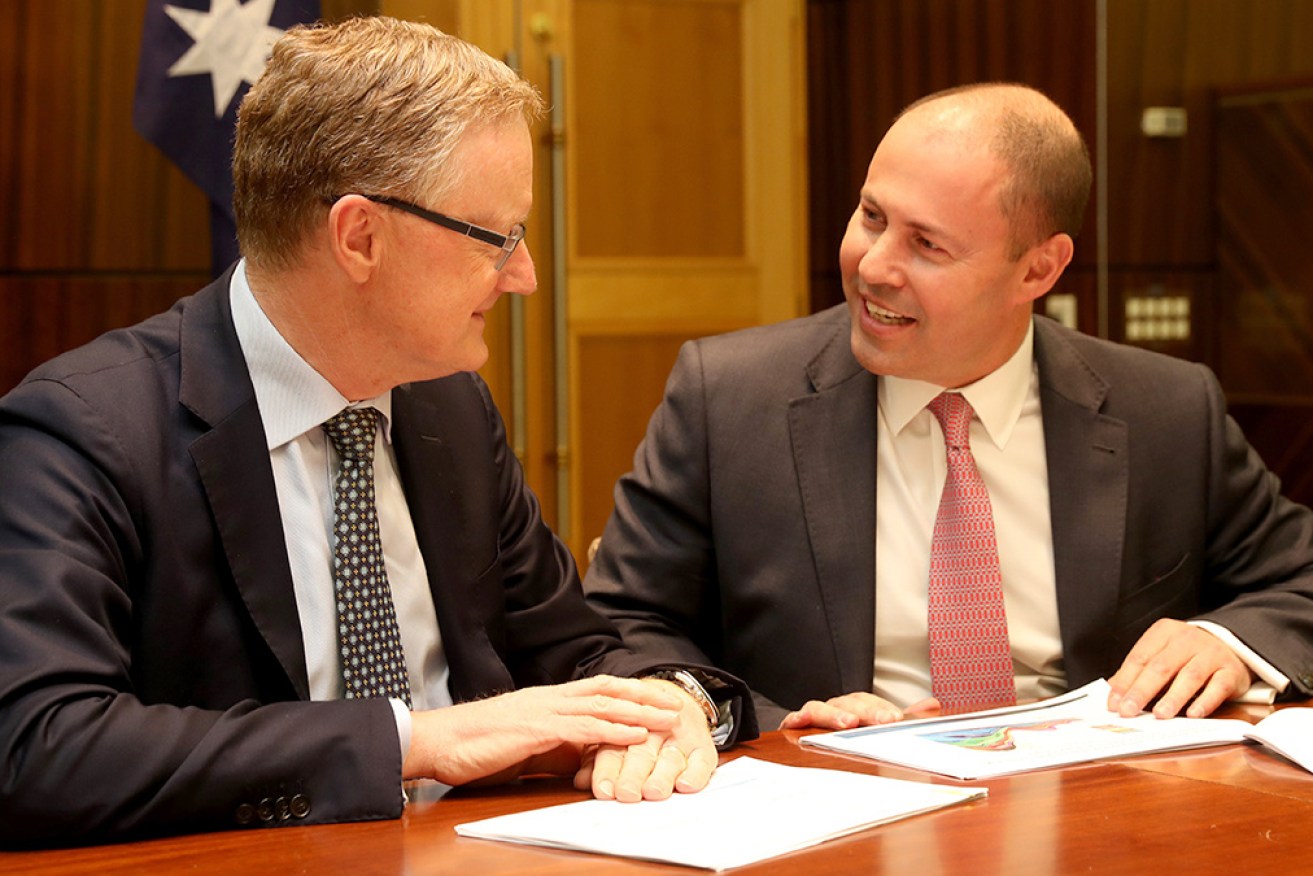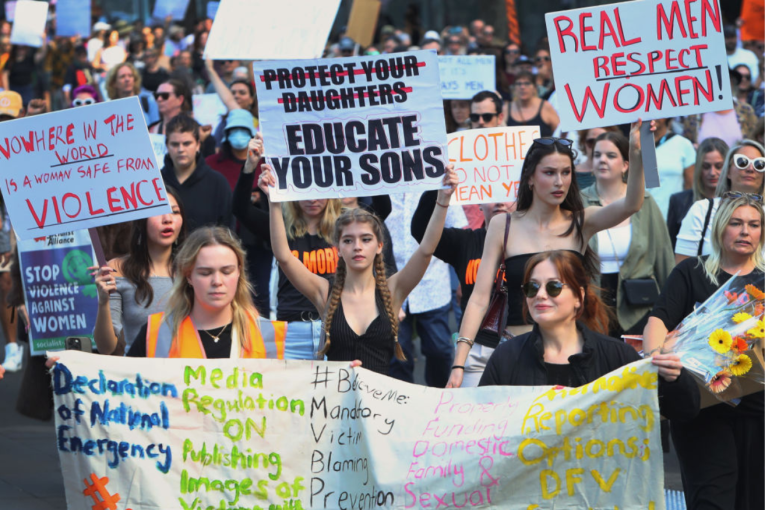Fire chief Frydenberg can’t smell the smoke, won’t turn on his hose (what the IMF downgrade really means)


There is smoke coming from the economic house – some see sparks and flames.
Fire chief Josh Frydenberg says he can’t smell the smoke and dismisses all reports of fire. He’s refusing to turn on his Treasury hose, even though it’s plugged into the water mains.
Assistant-chief Lowe can see smoke and flame. He feels forced to spray the house with everything he’s got, even though “everything” is only the contents of the Reserve Bank fire truck, which is running perilously close to empty.
Maybe it’s not surprising then to realise that 14 months after Fire Chief Frydenberg joined the brigade, he hasn’t yet formalised how he and the much more experienced Lowe are supposed to work together.
Instead, they’ve been regularly disagreeing in public about how to deal with fire and its prevention.
That’s pretty much what the government’s reaction to the International Monetary Fund (IMF) downgrade of Australia’s economic growth boils down to, along with the passing of a telling milestone.
It’s five months today since the federal election, but there’s still no sign of the Treasurer and RBA governor reaching the usual agreement on the conduct of monetary policy, how the government expects the RBA to do its job.
This is unprecedented. It’s normally done within days of an election.
The RBA released its annual report yesterday. Instead of referencing the expected new agreement, the report had to reach back three years:
“The seventh Statement on the Conduct of Monetary Policy, agreed by the Treasurer and the Governor on 19 September 2016, records the common understanding of the government and the Reserve Bank on key aspects of the monetary policy framework. This update of the statement confirmed the monetary policy framework in Australia, explicitly recognising that it is appropriate for the Reserve Bank Board to take account of financial stability considerations in determining the appropriate setting of monetary policy.”
So with the IMF joining the chorus warning about our economic health and the public disagreements between the Treasurer and Governor about what needs to be done, how bad has the relationship between the two key arms of economic policy become?
But first the IMF downgrade of our prospects. It is serious, though it shouldn’t come as too much of a surprise.
And it has been misreported by some media. It might sound pernickety, but the IMF downgraded its Australian 2019 calendar growth forecast from 2.1 per cent six months ago to 1.7 per cent.
That has been compared with the federal budget’s forecast of 2.75 per cent growth for the 2019-20 financial year. It’s not quite the same thing.
You might think forecasting 2019 with only one quarter to go shouldn’t be difficult, but knocking off 0.4 points in six months actually makes the extent of the downturn – the smoke and sparks – more stark.
And it can be compared with the RBA’s calendar year forecasts published in May and August. (The RBA and Treasury public forecasts can differ a little, but not much as they sup from the same joint-forecasting council bowl.)
Five months ago, the RBA growth prediction of 2 per cent for 2019 was within the rounding of the IMF’s 2.1 forecast.
The RBA stuck with 2 per cent just two months ago, but it’s been slapped by the IMF’s 1.7 per cent.
Similarly for calendar year 2020, the IMF has dropped from 2.8 per cent to 2.3 per cent, while the RBA has been steady on 2.75 per cent – which is what Treasurer Frydenberg predicted for the current and next financial year.
(The RBA and Treasury round their forecasts to the nearest quarter percentage point.)
The IMF economists make up their own minds about their forecasts nowadays, but they talk to the RBA and Treasury officials while they’re being formed. There’s an exchange of views and opportunities for some massaging.
I’d bet the RBA is in the process of downgrading the forecasts it will release in three weeks – the economic outlook that will guide the RBA board on whether to cut interest rates yet again on Melbourne Cup day.
If the board follows the bank’s forecasts then, you’d expect the cash rate to drop from 0.75 to just 0.5 per cent on the first Tuesday of November.
It’s rare for action to not follow such a revision – the decision in May, just before the election, being a strange exception.
Thursday’s solid rise in full-time jobs shouldn’t make a difference compared with a sobering speech on housing and the economy by deputy governor Guy Debelle a few hours earlier.
Dr Debelle admitted housing construction had turned down faster and further than the RBA had expected. The RBA now thinks the construction downturn will of itself knock one full percentage point off GDP growth from peak to trough, but the broader impact will be worse.
“For example, the residential construction sector has linkages to the business services sector through architects, draftspeople and construction engineers, and to the manufacturing sector through steel, bricks, etc,” he said.
“The residential construction sector itself accounts for around 2 per cent of total employment. But when we look more broadly, just under 6 per cent of employment is closely related to the residential construction sector.”
Dr Debelle said that while there’s still a high level of work in the pipeline, residential construction activity has fallen by 9 per cent since last September.

And it has further to go.
“Much of the downturn in construction activity is still ahead,” said Dr Debelle. “Building approvals are around 40 per cent lower than their peak in late 2017.
“We are forecasting a further 7 per cent decline in dwelling investment over the next year, and there is some risk the decline could be even larger.”

(Building approvals are an obvious leading indicator, but approved projects don’t always get built in a downturn.)
The impact is widespread – and spreading.
“Gross mixed income, which is primarily small business income, declined by 3.8 per cent over the past year,” said Dr Debelle. “Some part of this is lower incomes in the farm sector from the impact of the drought, but a sizeable part is low income growth from contractors in the residential construction sector.
“This has contributed to the overall historically low growth in household incomes and thereby to the lower growth in consumption. Growth in disposable income slowed from 4 per cent at the end of 2017 to 2 per cent by the end of 2018. We estimate that this explains around half of the recent slowing in consumption.”
And then there’s the ongoing wealth effect, the crash in housing turnover and something else the RBA didn’t expect: A bigger downwards impact on the inflation rate that the bank has been desperately trying to lift.
The initial surge in building reduced rents, there was “not much pressure” on building costs in construction-boom phase, builders were now offering discounts and the overbuild has since reduced rents.
Along with our biggest domestic problem of real take-home wages going backwards, the retail recession and the slowing international economy the IMF is particularly worried about, it all adds to the need for the RBA and federal government to be pulling in the same direction.
The Australian Financial Review interviewed Treasurer Frydenberg before he flew off for an IMF meeting in Washington on Thursday. The paper summarised: “The Morrison government has warned that blowing all or some of the forecast surplus to stimulate growth would be a panicked move that could leave the economy exposed, should the international situation worsen.”
Even “some” of the surplus. Cheesh. And he says it isn’t “a vanity project”. I call BS.
If he hasn’t already read the IMF report, the Treasurer will find out in Washington that the international situation is worsening – and so is Australia’s.
So what’s with not having an agreement on the RBA’s job after five months of such interesting times?
The kindest interpretation would be that the Treasurer doesn’t see it as much of a priority when he’s entirely focused on achieving that surplus and blaming Labor.
The most worrying speculation would be that it’s a sign of the breakdown in relations between our most important economic institutions, that Treasury is looking for some way of exerting greater control over the theoretically independent central bank.
Or Mr Frydenberg is seeking a mechanism for blame-shifting over the economy. He has said he wants to “strengthen” the agreement.
Or a means of handling a reduction in the inflation target is in the works – unlikely.
Or – a big one – a framework for handling “unconventional” monetary policy that is partly fiscal.
We’ve been left in the dark with only the knowledge something isn’t right after Mr Frydenberg floated balloons but hasn’t acted.
Treasury is suspected of leaking a suggestion that the Governor might be required to write a letter to the Treasurer to explain why if he misses his inflation target – something the Bank of England has to do.
It’s an odd suggestion. The RBA is forever explaining what it’s doing, making a formal letter ridiculous as well as pointlessly humiliating – just a reminder of who’s boss, or that the Treasurer feels insecure, needing to throw his weight around.
And the Treasurer should be careful what he wishes for. If the reason the inflation target is missed is because fiscal policy is too tight, he might not welcome the Governor putting that in writing.
Maybe the Treasury and the RBA are actually engaged in mutually constructive dialogue to modernise a 23-year-old agreement with an important-sounding but relatively minor amendment. Yeah, maybe.
In any event, transparency would be a good thing. The unseemly delay is not a good look, given how well that agreement has served the country for nearly a quarter of a century.
Given the usual choice between a conspiracy and a cockup, Mr Frydenberg probably has somewhat forgotten about it and the RBA is in no hurry, the 2016 deal suiting it fine.
It’s just too bad though about the fire alarms going off.
We must hope Mr Frydenberg and Dr Lowe get to spend some quality time together in Washington at the IMF meeting.








